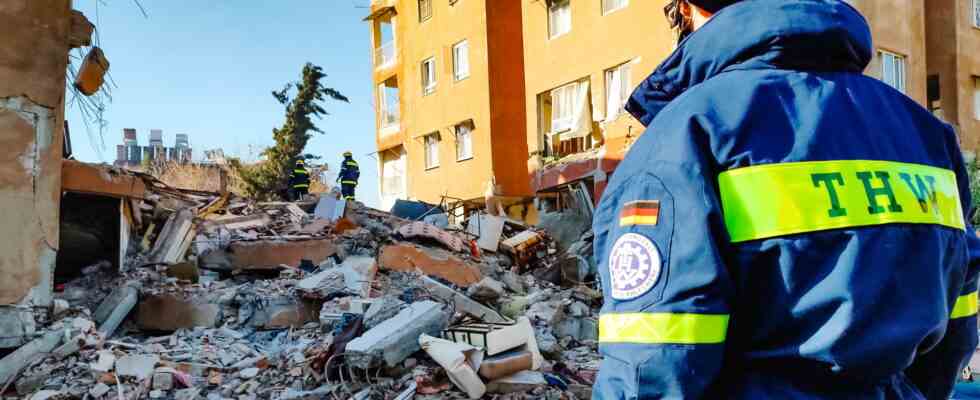Status: 02/11/2023 3:13 p.m
German and Austrian rescuers have suspended their earthquake aid in Turkey over safety concerns. There are reports of clashes, as the THW announced. Shots are also said to have been fired.
The Technical Relief Agency (THW) and the aid organization ISAR Germany are interrupting their rescue work in the earthquake area in Turkey for fear of possible riots. According to various information, the security situation in the Hatay region has changed in the past few hours, the organizations said. “There are increasing reports of clashes between different groups, and shots are said to have been fired,” said the THW.
Search and rescue teams will remain at the joint base camp in the city of Kirikhan for the time being. If there is a concrete indication that someone can be saved alive, they will still drive out, said THW spokeswoman Katharina Garrecht on site. “Our emergency services have not heard anything from the riots so far,” said the THW. An ISAR spokesman said: “According to our information, the aggression is not directed against German helpers.” So far there have been no threats.
ISAR: Sadness is slowly giving way to anger
Experience has shown that there are different phases in catastrophes such as an earthquake, the ISAR spokesman said. “We are currently in the phase in which the hope for survivors under the rubble is diminishing. For this reason, the people sometimes turn into deep sadness and sometimes into anger about their personal losses.” In addition, there were difficulties with the water and food supply, which put a strain on those affected and in some cases frustrated them. ISAR head of operations Steven Bayer said: “It can be seen that sadness is slowly giving way to anger.”
According to THW, the German helpers acted in coordination with the Turkish civil protection Afad. As soon as he classifies the situation as safe, work will resume.
Soldiers from a disaster relief unit of the Austrian military had previously stopped their rescue work in Hatay province. “There is increasing aggression between groups in Turkey. Shots are said to have been fired,” said Lieutenant Colonel Pierre Kugelweis from the Austrian Armed Forces of the APA news agency. However, the Austrian rescuers also remain on site and are available for further operations.
More than 24,000 dead in Syria and Turkey
The number of confirmed dead is now more than 24,000. The Turkish authorities recently spoke of 20,930 fatalities and 80,052 injuries. 3,500 deaths were reported from Syria.
Since the number of missing persons is still very high, it is to be feared that the number of victims will increase drastically. But survivors are also being rescued: In the Turkish city of Kahramanmaras, a nine-year-old boy was rescued from a collapsed house after around 120 hours, according to the Israeli army. In Hatay province, a two-month-old baby was recovered after 128 hours, according to the state news agency Anadolu. In the city of Adiyaman, a couple was rescued even after 129 hours.
Meanwhile, it was revealed that a woman who was found buried under rubble after about 100 hours on Friday died in hospital. That reported WDR-Reporter Jens Eberl on Twitter.
WHO calls for expansion of Syria aid
According to the World Health Organization (WHO), aid for the earthquake victims in Syria must be significantly expanded. “We need to act with more urgency, on a larger scale, and to organize better,” said Richard Brennan, WHO emergency response coordinator for the Eastern Mediterranean region.
The number of dead and injured is immense, but what is often neglected is the large number of homeless people. According to initial estimates, around 200,000 people have lost their roof over their heads in Aleppo alone in the government-controlled part of northwestern Syria, and another 140,000 in the port city of Latakia, said Iman Shankiti, WHO representative in Syria. The United Nations High Commissioner for Refugees (UNHCR) estimates that up to 5.3 million people in Syria have been made homeless by the earthquake.
The head of the WHO, Tedros Adhanom Ghebreyesus, is already on site. He landed at noon at the airport in the particularly hard-hit city of Aleppo, as reported by the Sana state agency. He now wants to visit hospitals and emergency shelters to get an idea of the situation. He also brought 35 tons of medical equipment for the earthquake victims.
Death toll after earthquake in Turkish-Syrian border area rises to around 24,000
Gabriele Dunkel, ARD Istanbul, daily news at 12:00 p.m., February 11, 2023
Turkey opens border crossing with Armenia
In order to better care for those affected, Turkey opened a border crossing to Armenia for aid deliveries – despite a deep hostility to the neighboring country. As the state news agency Anadolu reported, five trucks with humanitarian aid passed a border post in the Turkish province of Igdir. This was last possible in 1988 after an earthquake in the ex-Soviet Republic of Armenia.
According to the Turkish authorities, around 160,000 search and rescue workers are deployed. More than 7,700 helpers were sent to the earthquake area from abroad.
Aid organizations sometimes interrupt operations
Pia Masurczak, ARD Istanbul, February 11, 2023 at 2:36 p.m

